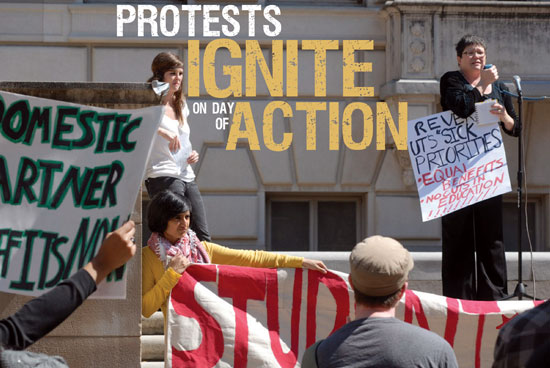Protests ignite on Day of Action
Corey Benson
Brad Denison
Jessica Jackson
Kelly Rathburn
Kara Rice
The Signal Staff
Thousands of students, faculty and staff members walked out of classes, picketed, marched and protested against declining state support and increasing costs of education March 4 in a Day of Action to Defend Public Education.
Students in 33 states including Texas have rallied in more than 120 events. In some instances students blocked entrances, effectively shutting down University of California-Santa Cruz. Although entrances were blocked at University of California-Berkeley, as of press time, the university was still open.
“I always remember a comment made by President Staples when I was working at UHCL, ‘Universities and colleges were once state-supported, then state-assisted, but now they are state-located,” said Steve Sutton, executive director of student development at University of California-Berkeley and former University of Houston-Clear Lake dean of students. “I think this says it well in that this protest is happening because faculty, students and staff are fed up with the rising cost of education and the declining state support. If you started at UC-Berkeley as a freshman in fall 2009, your fees will have increased by 32 percent by the time you return for your second year in the fall of 2010. This lack of support from the state is a residual effect of what many believe to be a broken system in our state government. That is why many have descended on Sacramento, our state capital, this week to exercise their right to protest.”
In Texas, events were held at University of Houston and University of Texas at Austin. Since the cap on college tuition was deregulated in 2003 under Gov. Perry’s administration, the cost of college tuition has increased 86 percent, while state funding has steadily declined. Just this year, all Texas state agencies including public universities have been asked to prepare budgets that reflect a 5 percent reduction.
“Texas is committed to preparing our students to enter the increasingly competitive global workforce by ensuring that higher education is available to more Texans,” said Lucy Nashed, spokesperson for the governor’s office. “From 2000-2009, statewide enrollment increased 37.4 percent, and under the governor’s leadership, financial aid has increased by more than 900 percent. The state continues to focus on accessibility, affordability and accountability to ensure that Texans are receiving a quality higher education, and the governor expects institutions of higher education to make prudent tuition decisions to meet the increased demand on services, while ensuring affordability and access for all Texans.”
University of Houston Regents approved a UHCL tuition increase of 4.54 percent for undergraduate students and 9.65 percent for graduate students in the Feb. 16 meeting. In addition to higher tuition, each of the four schools have added or increased designated and differential designated tuition.
Additionally, the student services fee has been increased and a one-time new student orientation fee of $30 will be charged in the fall.
“The state of today’s economy offers challenges for everyone at an individual level and at an organizational level,” said UHCL President William Staples. “State agencies, including universities, are not immune to a downward turn in the economy, particularly since state funding in Texas is based on sales-tax revenue. UHCL’s tuition and fee increase is necessary to continue to provide a quality educational experience to our students. The increase will be invested in transfer scholarships, financial aid, new student orientation, equipment and maintenance of labs and studios, purchase and maintenance of state-of-the-art equipment and upgrading security technologies. Other investments will go to adding and maintaining accredited programs, new full-time faculty and employee retention.”
Bill White, former mayor of Houston and democratic gubernatorial candidate, said the rate of tuition in Texas has risen to unacceptable levels.
“College tuition in Texas public colleges has risen more than 82 percent since 2003, far faster than financial aid and family incomes,” said Ally Smith, spokeswoman for Bill White.
Stop the Cuts, a student organization at the University of Texas at Austin, held a two-hour rally at 11:30 a.m. March 4.
“We don’t feel the budget cuts and layoffs are necessary,” said Laura Evans, founder of Stop the Cuts. “Once tuition was raised and Cactus Café was to be closed, we felt had to act. We decided to join in solidarity with the students in California because we were experiencing the same things. Even though not at the same level of the schools in California, we felt this was relevant to students in Texas.”
Evans estimates between 150 and 200 students attended the rally.
The Day of Action to Defend Public Education campaign began in California in response to the escalating cost of higher education and reductions in public funding for colleges and universities.
“I think that the state legislature is beginning to take notice,” Sutton said. “Governor Arnold Schwarzenegger expressed his commitment to higher education in the State of the State Address in January. As our Chancellor [Robert Birgeneau] said in a note to the campus, ‘In acknowledging that we can no longer afford to cut higher education and proposing a constitutional amendment to rebalance spending between education and prisons, the Governor has taken a bold and visionary step to reposition support for education among the State’s highest priorities.’ But, the state of higher education is only a symptom of a larger issue.”



Comments are closed, but trackbacks and pingbacks are open.